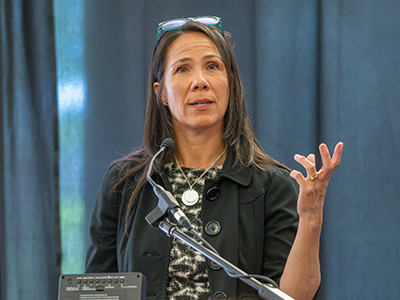Student Law Office Swears In New Student Attorneys

On Friday, August 16, more than 40 Sturm College of Law students took a solemn oath to use their knowledge of law “for the betterment of society and the improvement of the legal system,” as they were sworn in as new Student Attorneys in the law school’s Clinical Program. In doing so, the students became part of a 120-year commitment by the University of Denver to provide legal assistance to underserved individuals and communities through the Student Law Office — the first legal aid clinic in the United States.
120 Years of Making a Difference
In his introductory remarks, Dean Bruce Smith took pride in the fact that the American Clinical Legal Education Movement began at the University of Denver in 1904. “Every other law school – Harvard, Yale, Stanford, Michigan, Chicago, and the 195 others – they followed us.” Celebrating the 120th anniversary of the Student Law Office, and more than a century of offering legal aid to those in need, Dean Smith also took pride in the fact that the Sturm College of Law was ranked fifth in the nation for Clinical Training by U.S. News and World Report in 2024.
At this year’s swearing-in ceremony, the Student Attorneys represented five of the law school’s seven clinical programs: Civil Rights, Immigration Law and Policy, Environmental Law, Community Economic Development, and the Advancing Social Change Clinic, which is entering its third year. Colorado District Court Judge Nancy Salomone made the trek from Boulder to administer the oath and to share her thoughts on what it means to achieve success as a student attorney.
Defining Success
Sharing her own experiences with the audience, Judge Salomone remarked that “in the 25 years or so that I have been speaking to defendants and for clients, I’ve come to sometimes be able to recognize that your success on their behalf can mean a lot more than whether you win the case that you represented them on or not.” The primary focus, according to the judge, “is the importance of standing for somebody who doesn’t have a different person to speak for them.”
Beyond providing representation for individuals who feel disenfranchised, Judge Salomone noted that the Student Attorneys were really embarking on service to multiple communities: to the clients themselves and to the legal community. Recognizing that one of the challenges the legal community faces is in the form of injurious statements “to and about each other,” Judge Salomone suggested that an “antidote” to that harm is “a group of lawyers standing up for what they believe in when there isn’t personal gain for them,” a sentiment tied directly to the oath she was about to administer: “I will never reject, from any consideration personal to myself, the cause of the defenseless or oppressed.”
A Commitment to Service
Finally, Judge Salomone offered the example of a Harvard longitudinal study on happiness to tie these students’ commitments to their community back to their commitments to themselves. In the study she cited, the greatest predictor of happiness was a feeling of belonging – to value one’s community and to feel valued by it. “Service to your community is the thing that enriches your sense of wellbeing.”
In the often-competitive arenas of law school and the legal profession, our new Student Attorneys affirmed their decision to define success not only by winning or losing in court, but by standing with their clients, their professional community, and their own commitment to public service.



